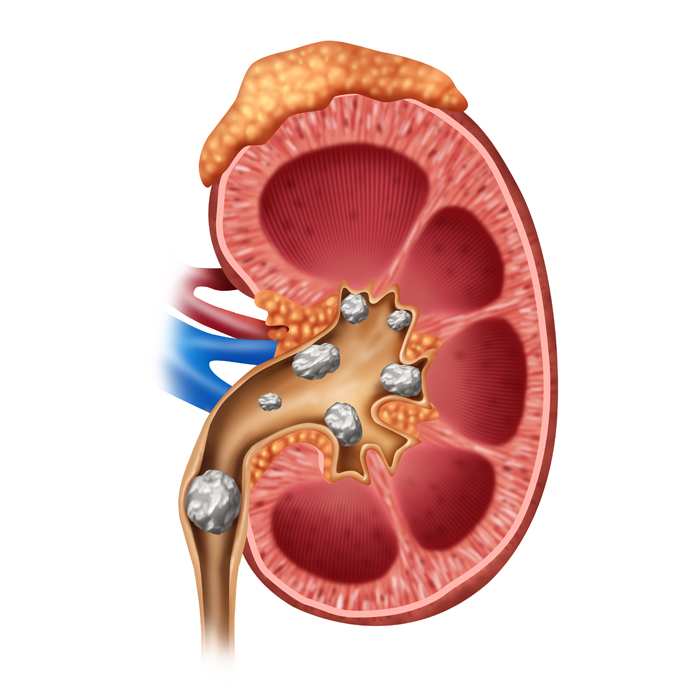Kidney Stones Treatment & Diagnostics in Sadashiv Peth, Pune
Kidney Stones
Also known as nephrolithiasis or urolithiasis, kidney stone is a condition where hard mineral deposits like stones form inside the kidneys. Although passing the stones can be a painful procedure, they usually don’t pose any permanent damage as long as the condition is treated swiftly. Obesity, diets, certain medications, or supplements can cause kidney stones.
In simple terms, kidneys make urine by flushing out the waste present in them. Sometimes, the wastes don’t get enough fluids, which means, they stick to each other and form a stone-line substance known as kidney stones.

What are the Symptoms of Kidney Stones?
For the symptoms to occur, the kidney stones will have to move around first. When that happens, the stone tries to pass through the ureters, where if the stone is big, it will get lodged in the ureters. This leads to spasms or swelling causing pain. Some of the most common symptoms of kidney stones include;
- Sharp or severe pain in your sides or your back, below the ribs.
- Extreme pain in your lower abdomen or groin
- Pain that keeps fluctuating
- Burning sensation or experiencing pain while urinating
- Pink, red, or brown urine
- Nausea or vomiting
- If there is an infection, fever and chills might also be experienced
When to See a Doctor?
If you experience the above-mentioned signs or symptoms, it is imperative to visit a doctor immediately. Seek urgent medical intervention if;
- You are suffering from extreme pain
- You are experiencing pain while vomiting
- Fever and chills are accompanied by pain
- Unable to pass urine or finding difficulty in the same
Request an appointment at Apollo Spectra Hospitals, Pune
Call 1860-500-2244 to book an appointment
What Causes Kidney Stones?
Each type of kidney stone occurs due to a different condition. Read below.
Calcium Stones: Generally, kidney stones are calcium oxalate and they occur due to your diet. Certain fruits and veggies as well as chocolate or nuts have high oxalate content in them. High doses of Vitamin D can also lead to the accumulation of oxalate.
Struvite Stones: When you suffer from Urinary Tract Infection, it can cause struvite stones as a response to the infection.
Uric Acid Stones: This occurs when people lose too much fluid due to medical conditions, such as chronic diarrhea or malabsorption. Certain genetic factors can also cause uric acid stones.
Cystine stones: These stones form because of a hereditary disorder where kidneys excrete too much of certain amino acids.
What are the Risk Factors?
Factors that increase your risk of kidney stones include;
- Family History: If your family has a history of developing kidney stones, then it is most likely you will experience it too. Also, if you have had stones before, it increases your risks too.
- Dehydration: Not consuming enough fluids can cause dehydration and cause stones.
- Certain Diets: Eating a diet in high protein, sodium, and sugar can put you at risk of kidney stones.
- Obesity: High BMI, large waist size, and weight gain can increase the risk of kidney stones.
- Certain medical conditions, medicines or supplements, and digestive diseases or surgery can also increase the risk of kidney stones.
How are Kidney Stones Diagnosed?
If your doctor suspects kidney stones, certain tests might be conducted to test if you have kidney stones. They include;
- Blood testing
- Urine testing
- Imaging
- Analysis of passed stones
What is the Treatment for Kidney Stones?
If the stones are small and can be passed through the urine, your doctor will ask you to drink enough fluids to ensure the stone passes away on its own. Pain relievers can also be administered to help reduce the pain.
When it comes to large stones, certain treatments can be recommended;
- Sound Waves: For certain kidney stones, your doctor can be recommended a procedure called extracorporeal shock wave lithotripsy, where sound waves are used to create strong vibrations to break the stones.
- Surgery: Percutaneous nephrolithotomy surgery, Parathyroid gland surgery, or a procedure using the scope can also be recommended to remove the stones.
It is important to understand that ignoring Kidney stone symptoms can lead to infections, which can be dangerous to the health. Therefore, timely medical intervention is necessary.
Request an appointment at Apollo Spectra Hospitals, Pune
Call 1860-500-2244 to book an appointment
Drink plenty of water, eat less oxalate-rich food, choose a low salt and sugar diet, and finally, be cautious while taking calcium supplements.
Men are more prone to kidney stones than women where every year about half a million people visit the emergency room because of kidney stones.
If someone in your family suffers from kidney stones, you are most likely to suffer from stones too.
Our Top Specialities
NOTICE BOARD
CONTACT US
CONTACT US
 Book Appointment
Book Appointment


.svg)
.svg)
.svg)
.svg)








